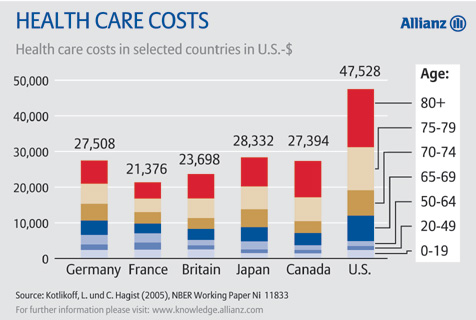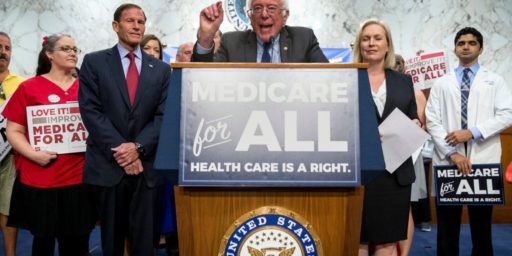Efficiency and Administrative Costs
For the sake of argument let us assume that Medicare’s administrative costs are lower than those of the typical health insurance company. Does this imply that Medicare is more efficient than the private company? I’ve been skeptical of this view point since one thing I’ve learned in economics is that firms want to maximize profits. You don’t do this by wasting money. In fact, at the profit maximizing level of output the firm is minimizing its costs. So, does it make sense that a health insurance firm is going to spend money it doesn’t have to on administrative costs?
One commenter put forward the idea that a CEO of a $10 billion dollar health insurance company is probably going to get paid more than the CEO of a $5 billion dollar health insurance company. Probably so, however, I’d also argue that the first CEO wont be CEO for long if he gets to the $10 billion mark by incurring losses of $5 billion. So I think we can rule this one out, or at the very least it needs quite a bit more to explain it than mere assertion.
So I’m still left thinking, “Really, the government is our model for efficiency?” This is the same government that has lost billions in the Pentagon and can’t find and probably never will. But when it comes to Medicare, which is an even bigger portion of the Federal government, nope they are so efficient we should implement the same standards globally. Even Paul Krugman indicates that this is true.
But the root source of Krugman’s beliefs disputes his views.
The higher administrative costs of private plans do not imply that those plans are less efficient than the traditional FFS program. Some of the plans’ administrative expenses are for functions, such as utilization management and quality improvement, that are designed to increase the efficiency of care delivery.—page 12
And via Greg Mankiw we now have this portion of testimony by Malcolm K. Sparrow, Professor of the Practice of Public Management at Harvard’s Kennedy School of Government,
The units of measure for losses due to health care fraud and abuse in this country are hundreds of billions of dollars per year. We just don’t know the first digit. It might be as low as one hundred billion. More likely two or three. Possibly four or five. But whatever that first digit is, it has eleven zeroes after it. These are staggering sums of money to waste, and the task of controlling and reducing these losses warrants a great deal of serious attention….
By taking the fraud and abuse problem seriously this administration might be able to save 10% or even 20% from Medicare and Medicaid budgets. But to do that, one would have to spend 1% or maybe 2% (as opposed to the prevailing 0.1%) in order to check that the other 98% or 99% of the funds were well spent. But please realize what a massive departure that would be from the status quo. This would mean increasing the budgets for control operations by a factor of 10 or 20. Not by 10% or 20%, but by a factor of 10 or 20.
Now at this juncture I want to say, “Why?” Why are Medicare’s Administrative costs so much lower, if they are indeed lower, than private industry? There has to be a reason and nobody that I know of has offered one. It is simply spouted as if it is true, always has been true, that private health insurance companies are dolts, always will be true, and if we just emulated Medicare we could save lots and lots of money that we could use to insure some of the uninsured you vile evil jerks!
In other words, Medicare’s really low administrative costs might come at a cost of hundreds of billions of dollars. If we emulate them in private health insurance then we will not be saving any money but losing money. Not only that, but we will likely accelerate the rate of increase of health care costs. After all we are going to having more wasteful spending on procedures that are not needed and any legislation on the issue will likely make access to health care easier for those who don’t already have access.
Now let us take a look at a graph that Dave Schuler dug up and posted today. Notice that for the 0-64 age range the U.S. is quite competitive with other countries, including the vaunted France. In fact, in eye-balling the chart the U.S. does better in terms of spending.
Note that the problem for U.S. health care spending is due to those 65 and older. Without them the U.S. spending on health care would be very low, even compared to places like France. If part of the reason why the spending on those 65+ is due to low administrative costs of Medicare and we force private health insurance to become more like Medicare then we could end up making the portion of the graph that is 64 and younger larger. We could exacerbate the problem, not make it better.
So answering this question of why are Medicare’s administrative costs lower is somewhat important. If there is research that answers this, I’d like to see it. But the distinct lack of such evidence leads me to believe it doesn’t exist. That nobody has asked the question let alone answered it.







You can not get away from the fact that the main reason US health care is so expensive is that we spend virtually unlimited amounts on keeping grandma and grandpa alive and kicking for a few more months.
Until you are willing to let them die peacefully at home any scheme to keep health care costs down are a pipe dream.
How much of the administrative costs incurred by the private insurance company is the direct result of mandatory reporting and regulations imposed by the government?
While regulation by and reporting to the government is not only acceptable but important to hold them accountable,it’s inefficiencies are certainly passed on to the insurance company by government bureaucracy.
Spencer;
Watch how you treat your parents….
Your children are watching.
Besides, while your premise seems plausible, it is far less true than you think.
Remember… liars may figger but figgers don’t lie!
OK, I’m fully prepared to be missing some large item here but, assuming that governments are universally wasteful and inefficient, wouldn’t this per capita chart illustrate the efficiency of govt run systems in other countries? Why is it then difficult to also say that our own govt run system would be as efficient?
I think the administrative costs are only one thing to look at, but what’s really being ignored is the benefit of preventative care.
The chart can be construed to illustrate this (although I admit it doesn’t necessarily do so).
My guess is that 80% of the costs of the 65+ crowd in the U.S. are from those who have had a decided lack of coverage and access to proper health care for the majority, if not all, of their lives, and we are seeing some sort of cumulative effect of that.
Perhaps the early coverage provided by the other countries in the charts maybe establish a preventative health benefit that we need to investigate. That the other countries 65+ groups are remarkably lower as a percentage of total cost than the U.S might be evidence of that.
Basically, from 0-64, most people are pretty healthy as a factor of biology, but when things break down, they can do so at an alarming rate.
Serious health events can be ameliorated with proper care and maintenance. Serious health events account for probably most of the costs of health care.
As I commented over at Dave’s place, I have a lot of experience with my state’s environmental insurance program, which spends a lot of money and time in denying claims. They do this in part because an earlier, more generous version of the program was being bilked. But they also do this because the government is a bureaucracy and in order to process claims, determine their necessity and reasonableness, they need lots of paper. And G*d save you, Mr. Buttle, if your name gets misspelled on the form-r-3D-6/7.
Brian, I think you’re overestimating the power of preventive care. The mortality rate is 100%
Mark, are you making an unstated assumption that everyone in these other countries is getting all the care that they are ggetting in the US, just for less money? This isn’t just about lifespans but also quality of life and that’s a real hard thing to measure.
Alas, luxuries become necessities. It is going to be very hard to stop anything that has already started.
1. The efficacy of health care approaches can only be measured when that care is rendered. Hence, we see measurable divergence of performance in the over 65 age group, where the bulk of expenditures are made. Look at the graph.
2. Whether you think it right or wrong, and whether due to policy or bureaucracy, health care is rationed outside the US. You would expect to see divergent expense performance.
3. The pro-government health care folks fascinate me. In my experience they are almost universally the same ones who moan about wasteful Pentagon spending. Its as if there were two lines at the civil service employment site. Into line 1 go the lazy, wasteful and perhaps evil dolts who find their way to the Pentagon……….and into line 2 go the energetic and efficient workers who will populate whatever government program the left is advocating at the moment. This is a universe with which I am not familiar.
4. Broken record: reintro price into the doctor patient relationship; get back to real insurance, not health maintenance. But you’ve heard this before…..
We don’t have the same type of government? Are all governments the same? Or are some worse from a public choice perspective than others?
Megan McArdle’s observations on that very subject:
Another factor: we’re much, much more diverse than even the most diverse European country. That makes a difference when you’re deciding what’s acceptable to you and what’s not.
I’m afraid I’ll need a bit of support from that chart. Which as I’m sure you know, is provided by an insurance and finance company.
The source of the data is referenced in the chart, Davebo. It’s from an NBER working paper.
Yes. I think overall, they’re probably getting more care than in the US given that it’s provided without the same types of requirements (premiums, pre-screens, insurance approvals). But probably have (depending on the country) less access to specialists.
yes but, I would say it’s rationed here as well just called something different. Rather than rationing based on the available resources of the medical service, it’s rationed based on the resources of those who can pay for the care they need or by the condition they have being “approved for care”. I think in both cases (US and other countries) you have some form of rationing.
true. same in terms of waste? I’d say yes to varying degrees but that’s an uneducated guess. I’d say yes to your last question but also, better. I read this: http://www.boston.com/bostonglobe/ideas/articles/2009/07/05/healthy_examples_plenty_of_countries_get_healthcare_right/?page=full and it sure sounds like they’re doing many things right in these countries.
I just find it extremely hard to believe that we can’t come up with a form of health care that is similar to those described in that article.
How about we take the French system plus 20%? Hell, France plus 50% would represent a staggering windfall for us. In fact, we could buy France with the savings.
We can’t blame our diverse population. France has minority groups. France has illegal immigrants.
And I don’t buy the “we do all the research” argument. The other countries on that chart are the other major medical research players. (Minus Switzerland.) It’s not as if we’re spending our research dollars just on cancer cures, we’re working on diet pills and baldness remedies and variations on Viagra. We’re not looking for cures for orphan diseases, we’re looking for pills that will turn huge profits.
The French have a diverse population, their population is actually older than ours, their people outlive ours, and they seem to like their system and yet they spend a fraction of what we spend.
The only reason we can’t do as well is that we don’t want to do as well.
My sources confirm this also.
I wonder if that comparison of lifespan takes into account the skewing of US lifespan from violent or accidental death. The general stats that are oft quoted about ‘our healthcare system costing far more but with worse outcomes’ does not, and the claim on this specific metric has been debunked. When you factor out the sizable number of US early deaths from homicide, suicide, and accident (mainly auto accidents), our lifespan is slightly higher than most countries’.
I would also throw in consideration of lifestyle- although I think the French are heavier smokers than we are so that might cancel out other negative lifestyle effects in the US like sedentary habits.
Actually no Davebo its provided by Laurence Kotlikoff and his co-author C. Hagist. Kotlikoff is a well respected academic and if you want to besmirch his name I suggest you come up with something better than that Bravo Sierra.
Mark,
All those countries that “get it right” are in the same boat we are in. Costs are rising too fast to sustain their programs. If that is getting it right you and Cohn don’t know what the word “right” means.
From the article you linked. Geez, I think I’ve been making precisely this point. That to truly get a handle on things we will have to have less care in this country not more. But no politician out there is saying this. None of them are being honest. Which of course re-inforces my dictum: Politicians–they all lie.
Michael,
Going bankrupt at a slower rate is not a windfall.
C. Stanley,
No. Nor does it take into account other things like obesity. Granted a medical problem, but it isn’t something that we should hope to address purely through health care. In fact, I’d argue that that approach would be the least cost efficient. Its a dubious statistic for making decisions about health care policy.
Being a smoker might actually save money. If a heavy smoker drops over dead at 50 due to a heart attack then he isn’t going to live another 75 years and die of some disease that would kill him over the course of 5 to 10 years eating up a huge amount of health care resources–i.e. money. Also, all other retirement benefits and such would go unused which is a windfall for the rest of society. A bit macabre perhaps, but something to consider none-the-less.
I don’t think rising costs indicate a system is “wrong” so much as it needs adjustment. By that I mean, while there may be things in the system that are creating deficits (very true) the idea of the system being there for everyone remains intact. France isn’t looking to overhaul it’s entire system. They are just make changes to reduce the impact of cost. People still get care more than Americans and that care still costs less overall.
OK, still trying to unpack why you’d quote that. What I read is that even with longer waits, dutch and french patients still sought out specialists and did less “avoidance” of care because the costs were low. The next sentence then states that even with longer waits there’s no evidence that care is less quality or less effective. So, I interpret that to mean that while the systems in place do make it harder to see specialists, the frequency and quality of the service remains high,effective and patients are satisfied with their care.
I don’t see where that indicates “less care”. Can you clarify? Did I miss your point entirely?
James, my recent post was snared by your spam eating monster. Probably the common issue of too many links. Please rescue it, and delete this post.
Profits are the motivation key for efficiencies; but when you have obscene profits your motivation decreases. It happens in all industries. (A CEO having a private jet idling by is NOT efficient). Healthcare, with its business models, government subsidy, customer ignorance simply does not represent a classical model where efficiencies matter much.